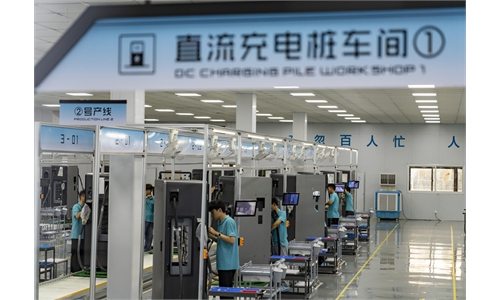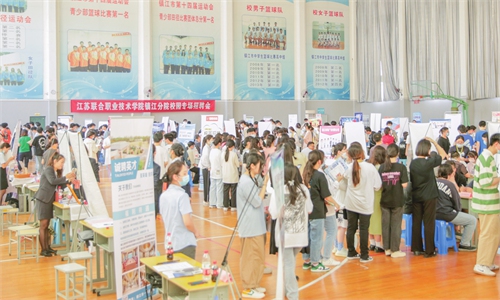Ministry holds meeting with private firms, vows to take new measures to optimize employment

New college graduates attend a job fair in Chengdu city, Southwest China's Sichuan Province, on July 2, 2023. A total of 11,547 positions were offered by 405 employers at the fair, which attracted 11,170 job seekers, and more than 2,630 employment intentions were initially reached. Photo: VCG
China's Ministry of Human Resources and Social Security hosted a meeting on Tuesday, aiming to solve enterprises' problems in attracting talent, and aiming to optimize employment and balance the labor-capital relationship. The meeting is part of a series of measures taken by the central government to support private enterprises.The meeting aimed to understand the development of private enterprises and to listen to their opinions and suggestions to find measures in the field of human resources and social security to bolster the private economy, according to the ministry.
The ministry will support businesses in hiring talent, protecting legitimate rights and interests of workers, and building harmonious labor relations. The ministry will offer policy support for job expansion and entrepreneurship, so that private enterprises can assume more social responsibilities in stabilizing employment, protecting the rights and interests of workers, and promoting shared prosperity, said Wang Xiaoping, minister of human resources and social security.
In order to open up more channels for private enterprises to put forward their operational issues, so that government departments could help them solve the problems impacting private investment, the National Development and Reform Commission (NDRC) on Thursday launched a "Private Investment Problems Report Column" on the National Online Approval and Supervision Platform for Investment Projects.
The minister's commitments are in line with a series of new measures by the Chinese government. On Monday, the National Development and Reform Commission (NDRC) launched a new bureau specializing in promoting the private economy's development. The bureau aims to strengthen policy coordination and ensure relevant measures are implemented.
The new policies and measures focus on providing targeted advice to the private economy, addressing the difficulties and problems firms face in the process of their development, Li Changan, a professor at the Academy of China Open Economy Studies of the University of International Business and Economics, told the Global Times on Wednesday.
According to data from the NDRC, the private sector occupies an important position in China's economy. More than 90 percent of China's enterprises are private, and they contribute more than half of the country's tax revenues and foreign trade, making private businesses the most important engine to fuel China's economic growth.
The minister also stressed the importance of the private economy during the meeting, saying the ministry will encourage and support the development of private companies, and actively improve relevant policies and initiatives to promote the private economy to become bigger, better and stronger.
The government measures aim to solve the problems of the private economy and build a more equal market environment, Li said.
On July 19, the Communist Party of China Central Committee and the State Council issued a detailed guideline on boosting the growth of the private economy, ensuring enterprises engage in fair competition and are protected equally by the law. Following the release of the guideline, eight Chinese ministries issued 28 measures to support the private sector.



